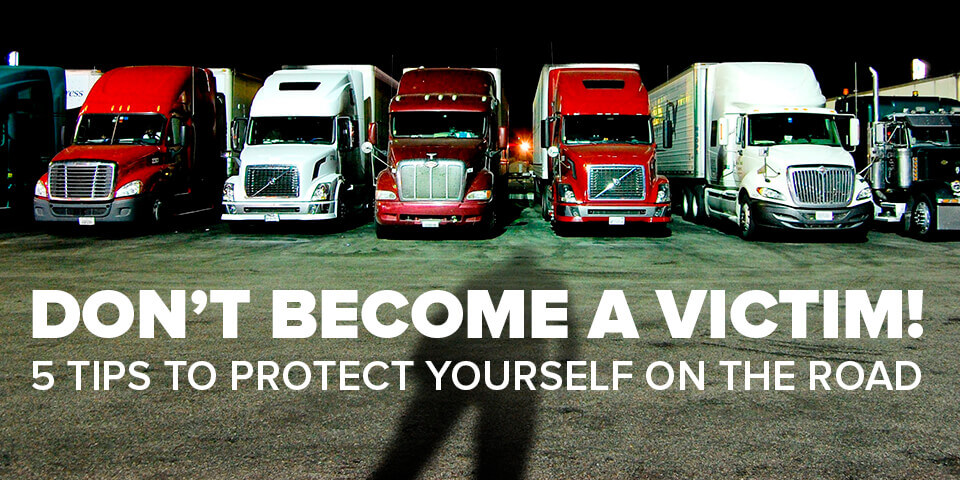
Don't Become a Victim! 5 Tips to Protect Yourself on the Road
When you're out on the road, you're not always in the best areas of town. And you never know when you're at risk of getting robbed or assaulted, whether you're a solo driver or run as a team.
So, what can you do to protect your property--and yourself? Here are five tips to give you greater security and peace of mind when you're on the road.
1. Be aware of your surroundings.
"The biggest thing is being aware of your surroundings at all times and not letting your defenses down at all," says John Mueller, President of Safety and Recruiting for Premium Transportation Logistics LLC. "Do a good vehicle check or a look-over of the vehicle before you get into it because somebody could have gotten into your truck. If somebody used a Slim Jim and got into the truck, they could be hiding in the sleeper. Check the cab and the cargo compartment for any signs of tampering before you get in."
Mueller says that one of the biggest challenges for drivers is to stay vigilant about their personal security because they often have so many other things on their mind. "They have ten thousand things going through their minds at any one given moment because they've got shippers and receivers questioning them and dispatch calling them all the time. They've got the regulations to worry about. They're worried about their equipment. They have to worry about things going on at home while they're out on the road. There are so many things that drivers are concerned about that I'm sure it becomes difficult to keep that alertness out there."
Recognize this tendency and do everything you can to maintain focus and alertness.
2. Park in secure, well-lit areas, where you're not alone.
"Park in well lit areas and look for security cameras," Mueller advises. "Look for well populated areas where there's high traffic, where people are going through there and staying there."
This way, you're putting yourself in an environment that discourages criminal activity.
3. Defend your space.
"The idea here is that you're defending your space -- your truck," says Gary Shade, a retired expedite owner-operator and author of the book "Hotshot Chronicles: Expediting Life @ 100 km/hour" (see hotshotchronicles.com).
So, how do you defend your space? Shade recommends starting with ensuring no one can get into the truck through the doors while you're sleeping, with a technique using the seat belt.
"Aside from locking your doors," Shade explains, "take your seat belt and run it through the armrest or an open space in the door. Then snap it into seat belt buckle. This way, you've got the seat belt running through the door, clipped onto the buckle, so that when you pull it tight, no one can get that door open because it's secured by a seat belt."
4. Prepare to defend yourself.
Depending on the state, trucking carrier, or delivery location, carrying a firearm may not be permitted. However, Shade offers these other options that you can take anywhere to deter criminals or even debilitate them if necessary.
- Short-handle crowbar: "When someone attempts to enter my space, the crowbar sends a real clear message to someone that I'm determined to protect my space--and myself," says Shade.
- Marine horn: "We would keep this in the back of the cab," says Shade. "The compressed air horn would spook somebody off, alert others that you're in trouble, or even change the consciousness of the person who wants to be a predator of some type."
- Wasp spray: "An aerosol can of wasp spray can stream poisonous goo out about 15 to 20 feet, which will disable the perpetrator and buy you time to escape and find help," says Shade.
5. Maintain consistent communication with dispatch.
"Consistent communication is essential to ensuring your safety," says Mueller. "It's part of our company policy that drivers are always checking in at least once every three hours. Now if six hours goes by, and they know the driver's been sleeping at a truck stop, this gives us an indication that something could be going wrong, with the driver in danger."
The Bottom Line
As you can see from these five tips, increasing your personal security doesn't have to take a lot of time or money. So, put them into practice to ensure you don't become a victim!
